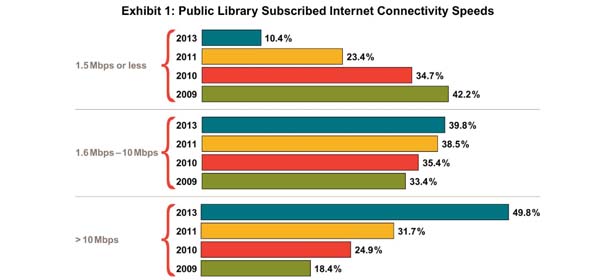
We’ve shared the Digital Inclusion Survey with you before, and now new research results dive into data specifically about broadband speeds in public libraries. More than 2,200 public libraries from 49 states reported upload and download speeds at their libraries for wired and Wi-Fi connections. City libraries reported median download speeds of 30 Mbps (wired) and 13 Mbps (Wi-Fi), while rural libraries reported medians of 9 Mbps (wired) and 6 Mbps (Wi-Fi).
According to the most recent data, about half (49.8%) of all libraries reported download speeds of more than 10 Mbps, up from just 18% that had achieved those speeds in 2009. The percentage of libraries with the slowest public Internet speeds of 1.5 Mbps or less dropped to 1 in 10 in 2013 from 42.2% in 2009. While the strides being made are exciting, the reality is that just 2% of public libraries meet national benchmarks set by the Federal Communications Commission for minimum speeds serving smaller communities (100 Mbps) and more than 50,000 people (1 Gbps).
Technical issues also abound, as might be expected when it comes to Internet connectivity speeds. Captured speeds—both at individual user’s devices and for uploads—lag behind subscribed network speeds. Peak use times meant reduced speeds, particularly for city libraries which saw direct download speeds drop 69% during heavy usage when compared to light usage periods.
Read the full report, including additional breakdowns by locale and connection type, here. This broadband discussion is even more timely considering Pew’s recent analysis of Census data about broadband access among households with children and the “homework gap” and what this information might mean for libraries. We’ll bring you more on that research soon.
Note: This post is part of our series, “The Weekly Number.” In this series, we highlight statistics that help tell the story of the 21st-century library.